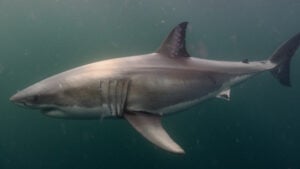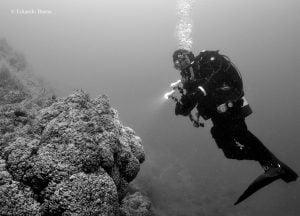
Wildlife
Jawsome: behind the scenes of Canada’s newest great white shark documentary
Korean-Canadian filmmaker Sonya Lee dives deep into the world of great white sharks for the latest documentary from CBC’s The Nature of Things
- 1781 words
- 8 minutes
This article is over 5 years old and may contain outdated information.
People & Culture
Sharkwater Extinction, the final documentary from Canadian filmmaker and activist Rob Stewart, is now screening across Canada

Canadian filmmaker Rob Stewart “had one singular focus in life, and that was to communicate a dire warning about how quickly our planet is changing,” wrote Royal Canadian Geographical Society Explorer-in-Residence Jill Heinerth last year.
Stewart died in a diving accident in the Florida Keys in 2017, but his family and team took up his mission, and his final film, Sharkwater Extinction, is now screening across Canada.
The film, which premiered at the Toronto International Film Festival in September, sheds light on threats to the world’s sharks. The documentary follows Stewart around the world as he investigates the illegal shark fishing industry and includes footage from his last day of filming.
Shark finning — the practice of harvesting shark fins, often while the animal is still alive — has been banned in much of the world, but sharks are still threatened by a myriad of illegal practices. In the past 30 years alone, the global shark population has decreased by 90 percent.
“We are now killing up to 150 million sharks a year — and it’s not just shark fin soup anymore. Sharks are now being killed and renamed and fed to us so we don’t know we are eating shark,” Stewart says in the film. “This is a massive scandal representing tens of millions of sharks every year.”
Boris Worm, a marine ecologist and biology professor at Dalhousie University, published a paper in 2013 that suggested 63 to 273 million sharks are killed for their fins around the world each year. Since the industry is lightly policed, it is difficult to ascertain the exact number, but it is a conservation disaster by any measure. Worm credits Stewart for helping researchers build a broader public understanding of the threat.
“We may never know the full extent of this, and it takes people like Rob to remind us of that.”
Are you passionate about Canadian geography?
You can support Canadian Geographic in 3 ways:

Wildlife
Korean-Canadian filmmaker Sonya Lee dives deep into the world of great white sharks for the latest documentary from CBC’s The Nature of Things

People & Culture
Filmmakers Doug Neasloss and Deirdre Leowinata explore how this captivating film came to be, the significance of bears in Indigenous communities and cultures and the importance of storytelling

People & Culture
The story of how a critically endangered Indigenous language can be saved

People & Culture
Based on the film documentary of the same name, The Third Dive looks to expose the circumstances around Rob Stewart's untimely death.